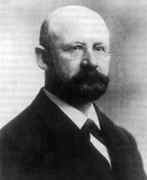Person: Bolza, Oskar

Oskar Bolza worked on function theory, integral equations and the calculus of variations.
Mathematical Profile (Excerpt):
- This proved to be too demanding for Bolza so he decided to concentrate on physics at the University.
- From 1878 until 1881 Bolza studied mathematics under Christoffel and Reye at Strasbourg, under Schwarz at Göttingen and under Weierstrass at Berlin.
- He attended Weierstrass's 1879 lecture course on the calculus of variations which was to have a lasting effect on the direction that Bolza's mathematical interests would take.
- Despite working under such an eminent collection of mathematicians, Bolza did not find a research topic.
- He was well on his way to a doctorate when he learnt that Goursat had discovered the results he had obtained before him, and even worse was the fact that Goursat's methods were more elegant than Bolza's.
- Given his earlier doubts one might think that this would be the final straw which would make Bolza give up completely the notion of research.
- Bolza had become a close friend of Maschke's while the two studied together at Berlin.
- Maschke found working with Klein in his home in the evenings very rewarding, but once again Bolza suffered self doubts, feeling that he was not good enough to get an academic post in Germany.
- When one of his friends moved to the United States, Bolza was tempted to follow his example.
- There he met Newcomb who told Bolza that had he known that he was intending to emigrate to the United States he would have strongly advised against it.
- During 1889 Bolza worked at Johns Hopkins University where Newcomb gave him a temporary short-term appointment, then he obtained a position at Clark University.
- The University hired some excellent mathematicians, and there Bolza became a colleague of White and Story.
- While at Clark, Bolza published the important paper On the theory of substitution groups and its application to algebraic equations in the American Journal of Mathematics.
- Nine of the eleven members of faculty left Clark including both White and Bolza, who decided to return to Germany.
- He persuaded Bolza not to return to Germany but instead to come to work at Chicago.
- Bolza joined the University of Chicago in 1892 and then he persuaded Eliakim Moore to bring his friend Maschke to Chicago.
- Moore was a fiery enthusiast, brilliant, and keenly interested in the popular mathematical research movements of the day; Bolza, a product of the meticulous German school of analysis led by Weierstrass, was an able, and widely read research scholar; Maschke was more deliberate than the other two, sagacious, brilliant in research, and a most delightful lecturer in geometry.
- Between 1892 and 1910 the mathematics department was outstandingly successful with thirty-nine students graduating with doctorates (nine of them students of Bolza).
- Bolza published The elliptic s-functions considered as a special case of the hyperelliptic s-functions in 1900 which related to work he had been studying for his doctorate under Klein.
- Immediately after his return to Germany Bolza continued teaching and research, in particular on function theory, integral equations and the calculus of variations.
- The first Problem mit gemischten Bedingungen und variablen Endpunkten Ⓣ(Problem with mixed conditions and variable end-points) formulated a new type of variational problem now called 'the problem of Bolza' and the second studied variations for an integral problem involving inequalities.
- Bolza returned to Chicago for part of 1913 giving lecturers during the summer on function theory and integral equations.
Born 12 May 1857, Bergzabern, Rhenish Palatinate (now Germany). Died 5 July 1942, Freiburg im Breisgau, Germany.
View full biography at MacTutor
Tags relevant for this person:
Algebra, Origin Germany
Thank you to the contributors under CC BY-SA 4.0! 

- Github:
-

- non-Github:
- @J-J-O'Connor
- @E-F-Robertson
References
Adapted from other CC BY-SA 4.0 Sources:
- O’Connor, John J; Robertson, Edmund F: MacTutor History of Mathematics Archive
